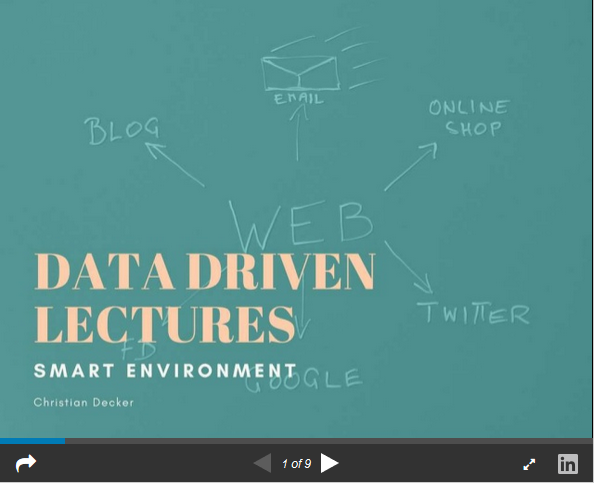tl;dr - What is a Smart Environment?
Radio interview on Smart Environments as part of my data driven lectures (lang = ger).

Introduction
A smart environment is a sensor and actuator instrumented room or space. Embedded networked computer systems make the room perceive physical state and activties within. In a smart environment user routines and information processes may seamlessly interact with each other.
At the HHZ, we have implemented a smart environment to support Data Driven Lectures (DDL). The installation runs 24/7 and supports students as well as lectures in learning and teaching activities.
Types of Smart Environments
Bascially, we distinguish between three stages of extension for smart environments.
| Type | Description |
|---|---|
| Remote Control | User control devices via apps; becomes more difficult to operate as the number of networked devices rise. Examples: weather station, alarm switches |
| Reactive Environment | Networked appliances enable automation of routines; users may create automation rules. Examples: Home automation using IFTTT |
| Adaptive Environment | Autonomous learning of daily routine and its automation support; computers become invisible, i.e. no explicit UI, environment acts according to users’ needs. Examples: Home automation using NEST |
Smart Environment for DDL
Data Driven Lectures (DDL) aim at a continuous progress and quality monitoring of my lecturing activities through the use internet technology. A classroom embedding various Internet-of-Things (IoT) technologies connects directly lecturing and learning activities. The room perceives the current situation of all attending students and enables immediate feedback and control on breaks, progress and pace of a lecture. As a result, it virtually appears that the environment reacts in an intelligent way, i.e. supporting the lecture.
Hardware and Software
- Controller: Raspberry Pi 3 running Home-Assistant (0.35.3) on Raspbian Jessie Lite (Kernel 4.4)
- Gateway and sensors platform: Arduino Nano (xcsource clone)
- Radio module: NRF24L01+
- Sensors:
- Temperature/Humidity sensor: DHT11
- CO2 sensor: MQ135
Research and Recent Activities
The research on smart environments is ongoing. We will continue to develop our smart environment for DDL further. Through various hackathons we try to identify common steps to build smart environments. The objective is to achieve a process-based understanding Students in the Masters program Digital Business Engineering attending my elective course Internet of Things (IoT) will actively participate in this endeavor.
Another branch of research is the investigation of big data and machine learning approach to efficiently process and reason on the data acquired by the embedded sensor systems.
Finally, the use of peripherial displays and other actuators to let the environemnt interact with people, is wide area of research we will explore.
Recent activities are reported in the articles below.
- Thekla Walker and Stefan Belz visit the HHZ, Tweet
- T. Strobl, State Minister of the Interior visits HHZ, Tweet
- June 2017, SCM Hackathon, blog post & projects
- January 2017, SCM Hackathon, blog post
Collaboration
If you are interested to collaborate in our activities, do not hesitate to contact me.
